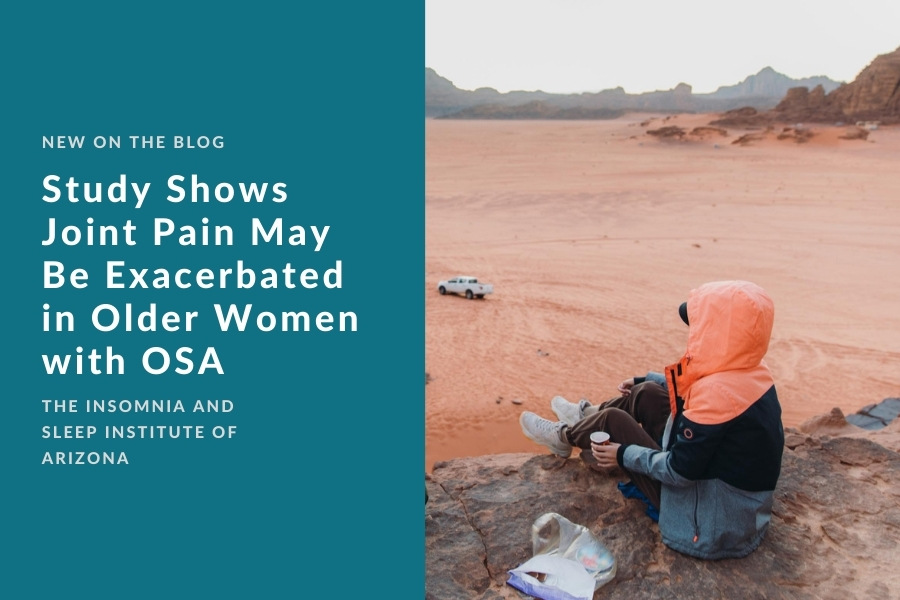Are you a woman with obstructive sleep apnea (OSA) who has noticed an increase in joint pain? According to a recent study out of Japan, OSA and exacerbated joint pain are linked in postmenopausal women. The right diagnosis is essential for informed testing and treatment—and it is crucial that a comprehensive approach be taken when addressing sleep disorders and their side effects.
According to the lead researcher, “Women complaining about their joint pains could be good candidates for a sleep-study to investigate if they have OSAS or not, especially when they are also suffering from fatigue.” Sleep disorders, and particularly sleep apnea like OSA (also known as OSAS for obstructive sleep apnea syndrome), are notoriously under- and mis-diagnosed. Although millions of people around the globe have received the right diagnosis for OSA, experts estimate that many more (perhaps millions more) remain without the right diagnosis. There are a myriad of negative complications when OSA is not treated, including an increased risk of heart attack, stroke, and diabetes. However, the research from Japan focuses on joint pain and fatigue, particularly in postmenopausal women.
The Onset of OSA
OSA is the most common kind of sleep apnea and occurs when airways get blocked while asleep. According to researchers, sleep apnea occurrences increase when women go through menopause—in fact, the prevalence is 4.5 times higher in this demographic compared to premenopausal women. Regardless of OSA, joint pain is also more common after menopause. Researchers suggest that both OSA and joint pain may be triggered by declining estrogen levels.
The team of researchers analyzed the links between OSA and a variety of symptoms in 51 postmenopausal women who were diagnosed with “treatment-resistant sleep disorders.” This included seven with a current OSA diagnosis. During an overnight sleep study, the respiratory disturbance index (RDI), which counts the number of “abnormal” sleep events in each hour, as well as transcutaneous oxygen saturation were recorded. According to researchers, there was a “significant association” between higher RDI (which is connected to more severe OSA) and joint pain. The participants completed a Questionnaire for Assessment of Climacteric Syndrome in Japanese Women.
What This Means for OSA Patients
The results align with a 2020 study (from the same team) that connects muscle and joint pain with insomnia in “middle-aged women.” The lead researcher said “it may not be very surprising that OSAS was shown to be associated with joint pains in another group of women.” However, “This study highlights an opportunity to increase identification of women with OSA, which is underdiagnosed in women who often present with vague symptoms such as insomnia, fatigue, and morning headaches.” Ultimately, the researchers hope that the symptom of joint pain might be an added consideration when diagnosing OSA in women.
OSA remains a vastly under-diagnosed sleep disorder around the globe. It can be difficult for many people to obtain a correct diagnosis, particularly when symptoms can vary person to person. Additionally, many GPs are not equipped with the training and latest information to diagnose a sleep disorder or refer a person to a sleep specialist. At The Insomnia and Sleep Institute, no referral is necessary to book a consultation with a sleep specialist. OSA is one of the most common sleep disorders around the world and it can present at any time. Changes, such as hormone or weight fluctuations, can certainly be the onset of the disorder. OSA can also be difficult to suspect since the most obvious symptoms (snoring or stopped breathing while asleep) typically must be reported by a partner. However, if you think you have OSA or are not getting the quality of sleep you need, help is available.
The Insomnia and Sleep Institute of Arizona takes a holistic approach to sleep medicine, which is why we have unprecedented staffing levels at our outcome-driven clinic. We are proud to serve as the Face of Sleep Medicine in Arizona, and are led by Dr. Ruchir P. Patel, triple-board certified and currently the Physician Director elected Board President of the Maricopa County Medical Society. Contact The Insomnia and Sleep Institute today to schedule your consultation. Call the office, or for the quickest response complete the online form.





